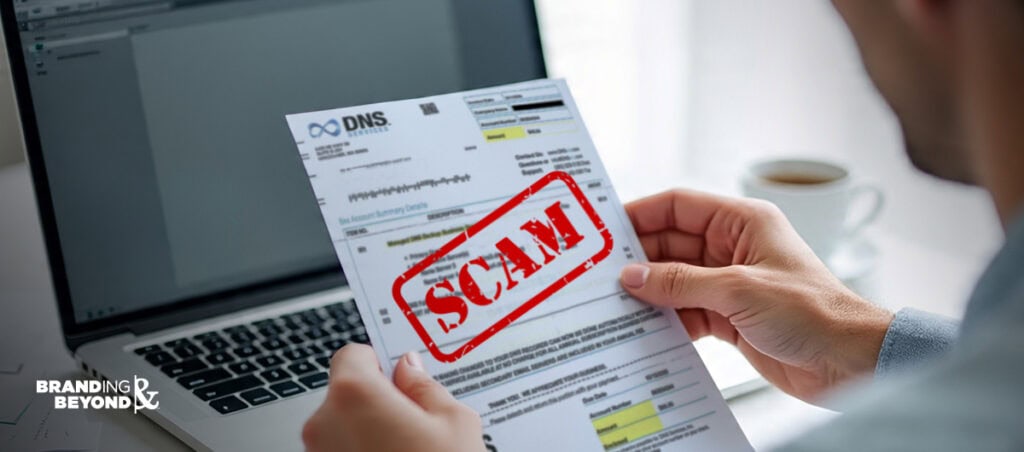
Don’t Get Scammed: How to Spot Fake Domain Registration Bills
Your accounting department just paid a $289 “domain renewal” bill. Plot twist: it wasn't actually for your domain renewal.
If this scenario sounds familiar, you're not alone. Fake domain registration bills are flooding businesses everywhere because scammers know that most companies don't understand the technical side of how domains and websites work. These fraudulent invoices are specifically designed to look legitimate while stealing your money.
Let me break this down so you can protect your business from these predators who are literally banking on your confusion.
Why Domain Scams Work: The Confusion Factor
Think of your domain ecosystem like running a business location:
Domain Registration = Renting your address (like, brandingbeyond.com)
- You're literally renting the right to use that web address (.com, .co, .edu, etc.)
- Can be rented for 1-10 years at a time
Usually costs $10-25 per year through legitimate domain registrars
Website Hosting = Renting the warehouse where your website files live
- Your domain points visitors to the location of your website
- Monthly or annual fees, typically $20-200+ per month
Email Hosting = Your company's mail service
- Could be Gmail, Outlook, or your own email server
- You can use any program, “mail client” to read your email, often it is Gmail or Outlook
- Your domain also handles the initial routing of company email (user@companydomain.com)
DNS Management = The front desk staff that routes customer calls to the appropriate team member
- DNS = Domain Name Service
- Usually managed at your domain registrar
- Tells the internet where to send traffic based on the type of traffic, to your website, email system, and anywhere else you have setup with your domain name (like a sub-domain support.domainname.com)
Sometimes all these services are purchased from one company (like GoDaddy). Often, they're split between different vendors. For instance, I prefer to use the best vendor for each job (domain/DNS, website hosting, and email management), but all these services are connected via the DNS listing. I manage website hosting for all of my clients, but I rarely handle their email setup. Occasionally, I also manage their domain registration if the company lacks in-house domain expertise.
This complexity is exactly what scammers exploit. They're counting on you not knowing who does what piece of the puzzle.
The Anatomy of a Domain Scam
Here are two real scam invoices that one of my clients' accounting departments almost paid:
Scam Example #1: The “Domain Networks” Bill


Red flags that scream SCAM:
- $289 for a domain listing? Legitimate domain renewals cost $10-25/year
- “This is not a bill. This is a solicitation.” It literally says this in tiny print, but they format it to look like an invoice. Most people don't read the fine print and assume it's legit.
- Vague services: “Annual Website Domain Listing” – what the hell does that even mean?
- Pressure tactics: Making it sound urgent and official
- They're not a domain registrar – they're selling worthless “directory listings”
Scam Example #2: The “DNS Services” Bill


This one's more sophisticated, but still BS:
- $65 for “DNS Backup Services” – legitimate DNS management is usually free from your domain registrar
- Who needs DNS backups? This is usually managed by the domain registrar already
- Official-looking format and official-sounding content designed to slip past busy managers and accounting departments
- Automatic renewal language to trap you into ongoing payments
How These Scams Work (It's Diabolical)
- They harvest public domain information from WHOIS domain databases
- Create official-looking invoices using your real domain name and company info
- Bank on your accounting department not understanding technical details
- Provide worthless or non-existent services in exchange for outrageous fees
- Count on businesses not noticing, so you’re getting scammed, possibly for years
It's brilliant in the most evil way possible.
How to Protect Your Business
Know Where Your Domain Lives & When It’s Due For Renewal
This is crucial. If you don't know where your domain is registered, find out NOW. Ask:
- Who registered it originally?
- What company did they use to purchase the domain (the registrar)?
- Who has login access?
- When does it actually expire?
Pro tip: You can look up domain registration info at https://lookup.icann.org/en. The important information is under “domain information”. This will tell you the nameservers (a clue as to where your site is hosted), when the domain was created, last updated and when it expires.
This site will also list contact information. Most of the time this information is masked. My domain (brandingbeyond.com) lists Contact Privacy Inc. as the registrant name because my registrar, Hover.com, has free domain privacy as part of the registration. This keeps my name, email, and phone number hidden from scammers and spammers. But they can still match the domain to a website, find the address, and send you a fake bill in the mail.
Red Flags to Watch Out For
Price: If someone's charging more than $50/year for basic domain services, be suspicious.
Bullsh*t Language: Watch for phrases like “domain listing,” “search engine submission,” or “directory listings” – these are usually scams.
Fake Urgency: Real domain renewals give you plenty of notice. Scammers create fake urgency because they know panic makes people stupid.
Wrong Renewal Date: The renewal date doesn't align with the actual renewal date listed in the the ICANN.org database
Unknown companies: If you've never heard of the company billing you, investigate before paying.
Before You Pay ANY Domain-Related Bill
- Verify it's from your actual registrar (the company where you actually registered your domain – sometimes the registrar companies get sold to other vendors, so names legitimately change)
- Don’t assume it’s a legit bill by their website – Scammers have great fake websites.
- Search the internet for the name of the company – often, there are reports from other victims that the company is fake.
- Check the services being billed – do you actually use them? Even if the bill is legit, are you paying your domain registrar for web hosting, but your site is hosted somewhere else?
- Compare the pricing to what you normally pay
- Send questionable invoices to your website management firm – they'll know immediately if it's BS. We receive suspect invoices on a regular basis.
- This applies EVEN IF your CEO or management approved the invoice – many executives don't understand the domain ecosystem either
Make Your Accounting Department Your First Line of Defense
Your accounting team needs to know this scam exists. They should be empowered to question ANY domain-related invoices, regardless of who approved them.
Create a simple protocol: Before paying any website/domain-related bill from an unfamiliar company, forward it to whoever manages your website for verification. Takes two seconds and could save you hundreds.
What to Do If You've Been Scammed
Don't panic, and don't be embarrassed. This happens to smart businesses every single day.
- Stop payment if possible
- Document everything – keep the fake invoices
- Report it to the FTC and your state attorney general
- Review your domain security – make sure scammers haven't gained access to anything important
- Add the scammer's company name to your accounts payable “do not pay” list, so no one in the future falls for this scam.
Here's the Deal
Domain scammers are counting on your accounts payable department not realizing the invoice is total BS. Your company's domain is a critical business asset. No one wants to be responsible for not renewing it and causing your website to go dark and your company email to stop working.
But here's what pisses me off: these scammers are literally stealing from businesses who are just trying to do the right thing and keep their websites running. They're preying on the fact that most business owners have better things to do than become domain experts.
Your best defense? Knowledge, verification, and a good website management partner.
When you get a domain-related bill, take two minutes to verify it's legit before paying. A little paranoia here could save you from getting suckered by scammers.
Need help sorting out your domain situation? If you're not sure where your domain is registered or who manages what, let's get it figured out. A little clarity now can save you from headaches (and scam bills) later. Book a quick call to audit and document your domain setup.
Tracy O'Shaughnessy helps commercial building trades get their brand sh*t together so they can stop apologizing for their websites and start getting noticed and hired. If your website isn't supporting your sales team the way it should, let's talk!
Tracy O’Shaughnessy Founder / Lead Brand Strategist of Branding & Beyond
Tracy and her team help firms in and around the B2B building trades look and sound credible online and off.
She has been in the industry since the early '90s and is tired of seeing fantastic firms struggle, blend in, and get bypassed by prospects who judge them solely on the outdated information found online.
Branding & Beyond's mission is to solve real business problems and build the brand foundation clients need to get noticed and hired.
You can find Tracy on Linkedin and here on this blog.
